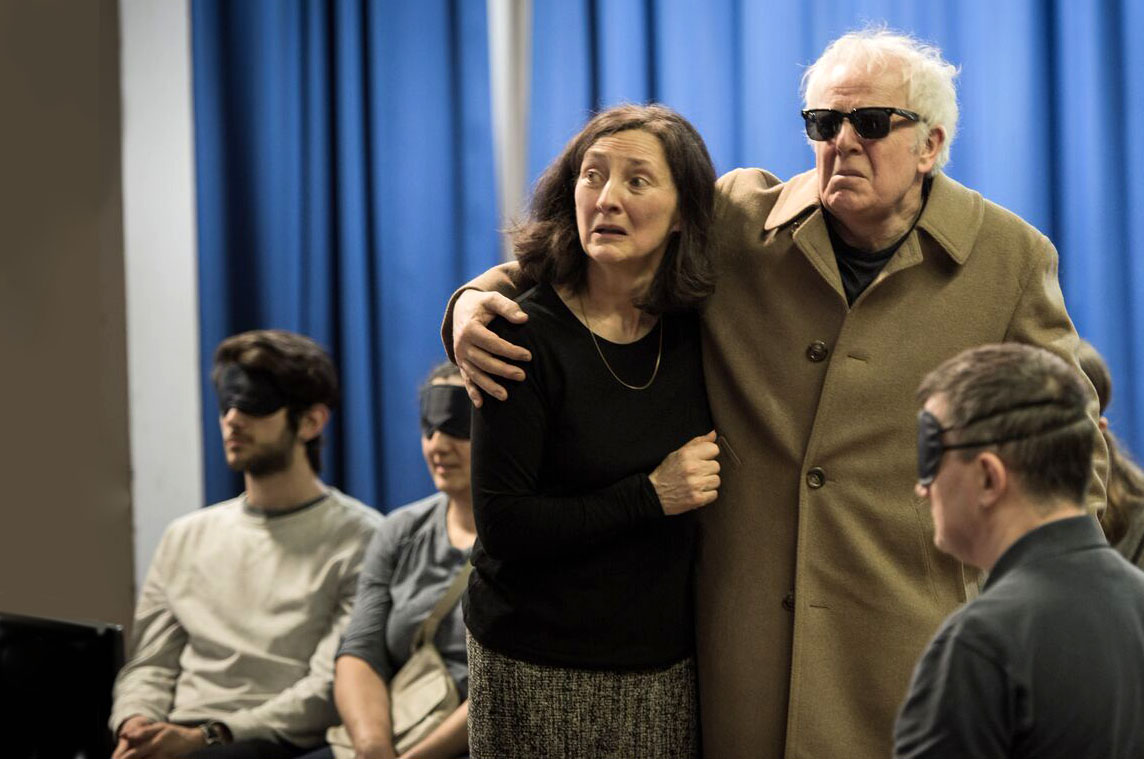
This co-production by Out of Joint and the Happy Days Enniskillen International Beckett Festival presents us with something rather paradoxical; a ‘show’ that cannot be seen. The audience is given blindfolds to wear throughout the performance. All That Fall originated as a radio play, but why adapt it for the theatre if not to let us see it? It might be thought that we are being short-changed, but in fact much is gained in the darkness. One reason is that this approach creates a kind of aural spaciousness, a vivid three-dimensionality of sound as the actors move around an audience that has to rely entirely upon what they are hearing. One’s imagination is set to work hard.
The central character is Maddy Rooney; a formidable ‘fat jelly’ in her seventies, half-crippled and full of self-pity. She is also childless. Maddy is making her slow way towards Boghill railway station. It’s her husband’s birthday and she is meeting him off the train. She meets Christie, a dung carrier who tries to sell her some of his load. His hinny is stubbornly immobile and we hear her being whipped into action. The failings of different forms of transport are to become a recurrent theme. As Maddy moves on she has tearful thoughts of ‘Little Minnie’, until she is distracted by the sight of a beautiful laburnum.
She then encounters old Mr. Tyler, whose daughter has had an operation that has left her unable to have children. Obsessed with her own troubles Maddy takes Tyler’s sad news as a cue to again dwell upon ‘Minnie’. Is she remembering a dead child? We are not told. Tyler cycles off with a flat rear tyre; moving from A to B in this corner of Ireland would appear to be a constant struggle. The last man she meets before finally reaching her destination is Mr. Slocum, an ‘old admirer’, who offers her a lift in his car. The idea that this journey is fraught with difficulty continues, for she needs Mr. Slocum to shove her fat, clumsy body into the vehicle, and in the process her frock becomes caught in the door. Sound designer Dyfan Jones has clearly relished the opportunities presented by this comic sequence. The car will not start without difficulty, for it is as uncooperative as Christy’s hinny, and no sooner has Slocum got it going than he runs over a hen. They do eventually arrive at the station and after some considerable effort she succeeds in squeezing herself out of the car, though not without the porter’s help. Throughout her journey Maddy has received both help and sympathy, though she remains convinced that she is ‘famous’ for being ignored.
The train is late, but what has delayed it? Eventually the train arrives and she is reunited with her husband Dan, who is blind. Short-tempered, he will not reveal why the train was late, and their journey back home is full of unanswered questions. The weather changes for the worse, the laburnum has faded, and there are rotting leaves in the roadside ditch. There are further elusive references to the death of children and the mood grows darker and more ambiguous. We hear of a tragic accident; it may be that we have heard of something worse. Has there been a crime? We remove our blindfolds, but Beckett leaves us in the dark.
Maddy Rooney is a wonderful tragi-comic creation, and Brid Brennan endows her with a wonderfully rich, creamy voice, highly expressive in its musicality. She is well supported by the rest of the cast, particularly Gary Lilburn who plays both Tyler and the irascible Dan Rooney. Director Max Stafford-Clark has created something decidedly unusual and intriguing, and The Bristol Old Vic’s paint shop is well suited to this play; such a long but relatively narrow space is appropriate for a story that takes us on a journey up and down a country lane. I found All That Fall a satisfyingly immersive experience. Recommended. ★★★★☆ Mike Whitton 10th March 2016
Photo by Robert Workman

